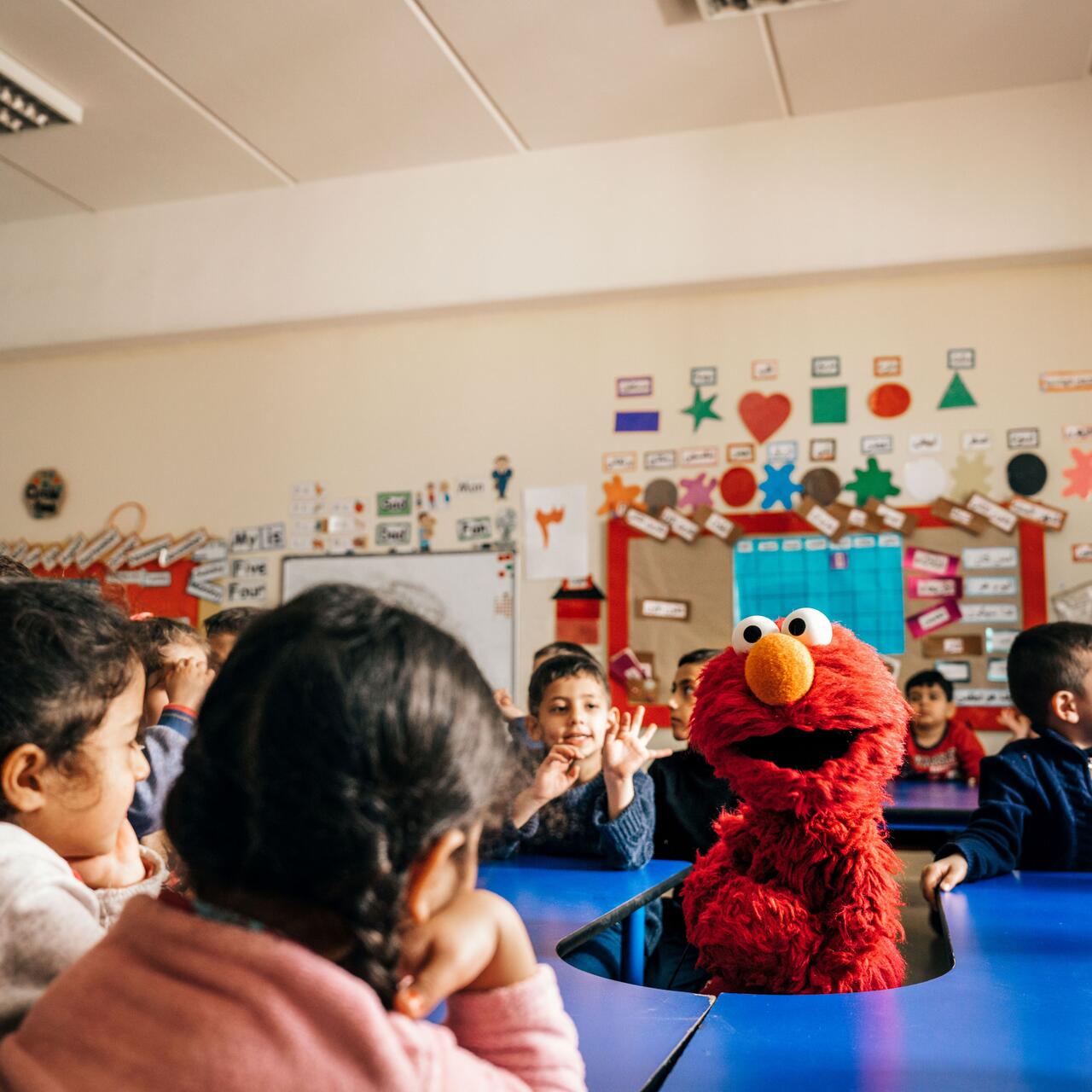
The groundbreaking impact of Ahlan Simsim
Learn more about the impacts of the largest early childhood intervention in the history of humanitarian response.

Learn more about the impacts of the largest early childhood intervention in the history of humanitarian response.
In 2018, the International Rescue Committee (IRC) and Sesame Workshop, the nonprofit organization behind Sesame Street, partnered to create an early childhood intervention supporting children living in crisis and conflict affected regions to grow and thrive.The initiative is called Ahlan Simsim, which means “Welcome Sesame” in Arabic, and is the largest early childhood intervention in the history of humanitarian response.
The initiative has reached over 1.3 million children and caregivers with direct services for families across Iraq, Jordan, Lebanon and Syria. Another 23 million children have watched an all new Arabic-language version of Sesame Street, titled Ahlan Simsim after the initiative, aired across the Middle East and North Africa.
Studies on Ahlan Simsim’s initiatives, published by the NYU Global TIES for Children global research center, demonstrate the power of quality early childhood programs integrated with educational media. These findings have groundbreaking implications for our ability to level the playing field for children around the world who are unable to access traditional in-person preschool.
Read on to learn more about the Ahlan Simsim initiative and its impact on children affected by conflict and crisis.
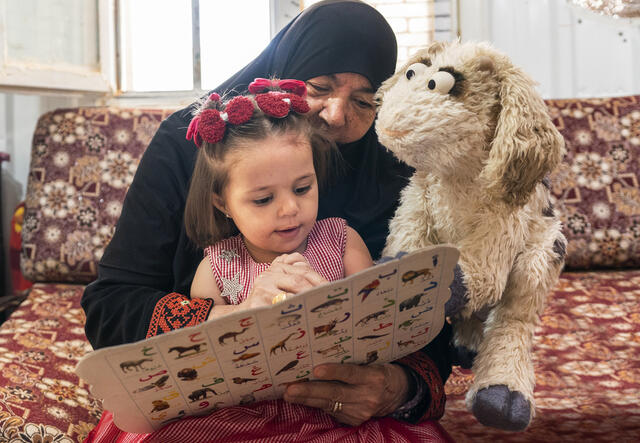
Research shows that the first five years of a child’s life are the most crucial for brain development. Unfortunately, children who live in crisis and conflict affected communities face immense stress and adversity in these critical years.
“There is no time in a child’s life more important than their first five years, when their brain is rapidly developing and most sensitive to its environment,” explains Sherrie Westin, president of Sesame Workshop. “We know that repeated exposure to trauma can inhibit brain development with long-term repercussions, but we can mitigate these effects through quality early childhood development and nurturing care.”
The Ahlan Simsim initiative combines the IRC’s expertise of working in communities affected by crisis with the proven impact of Sesame Workshop’s educational media. The initiative meets children and caregivers in their own homes and communities by providing localized in-person and remote early childhood development services alongside accessible broadcasts of the Ahlan Simsim TV show.
Ahlan Simsim works closely with local and national partners to deliver a variety of direct services in Iraq, Jordan, Lebanon and Syria. Programs include preschool classes, school readiness programs for children entering the first grade, parenting support programs and training for teachers and daycare providers. The program also integrates early childhood development information and activities into local health care systems.
Ahlan Simsim works closely with partners to ensure that programs are accessible for families in need and to improve early childhood development across national systems for years to come.
Over 1.3 million children and caregivers have benefited from Ahlan Simsim direct services for families; in the coming year, that number will surpass 1.5 million.
Watching Ahlan Simsim helps children identify emotions of fear and frustration and teaches them coping strategies, like pausing to breathe in emotionally stressful situations. The show emphasizes social-emotional skills, critical for children impacted by conflict and crisis, and also strengthens children’s literacy and numeracy skills.
In the Arabic-language version of Sesame Street, new characters join familiar faces like Elmo and Cookie Monster to teach children important lessons and promote healthy early childhood development. These new characters are designed to be relatable to children living in vulnerable situations.
For instance, one character, “Jad,” left his home for a new community. His new friend “Basma” welcomed him. The Ahlan Simsim show also introduced “Ameera”, a character who uses crutches or a wheelchair, enabling children with disabilities to see themselves reflected in the show.
The Ahlan Simsim show is easily accessible and designed to support the needs of children impacted by conflict or crisis. The show reached over 23 million children in its first five years on the air.
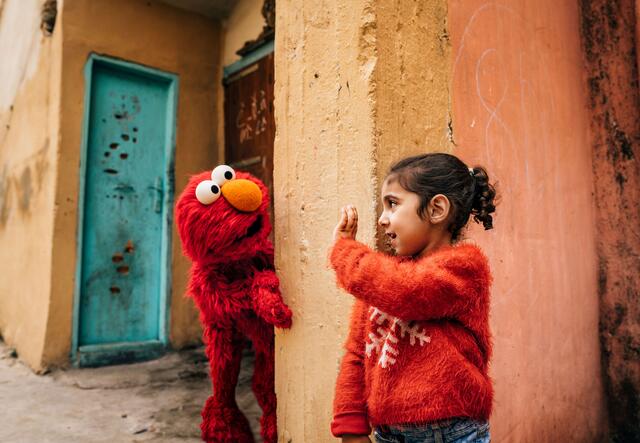
The NYU Global TIES for Children global research center recently released new findings on Ahlan Simsim that demonstrate the power of integrating educational media with early childhood development services. The studies have significant implications for delivering early learning in humanitarian and other contexts where traditional in-person schooling is not possible.
“These studies, the result of years of collaboration show how quality early childhood programming can have impressive positive impacts on caregivers and young children in a region affected by displacement and crisis,” said Hirokazu Yoshikawa, Ph.D., co-director of Global TIES for Children and an NYU professor.
“They provide new evidence that innovations in educational media and in leveraging caregivers’ support of learning can improve children’s holistic development.”
Below are three Ahlan Simsim programs studied by NYU Global TIES for Children.
In Lebanon, researchers studied the impact of an 11-week-long remote preschool program, predominantly supporting Syrian refugee families. Trained teachers provided instruction over WhatsApp to groups of parents, who then conducted educational activities with their children at home. Families received educational packets containing worksheets and art materials, as well as access to educational media like videos and storybooks. They were also given prepaid internet bundles to facilitate their participation.
Researchers found that this program produced statistically and developmentally significant impacts on children, particularly for literacy, numeracy, and social-emotional skills. The impact was comparable to global studies of year-long, in-person preschool programs.
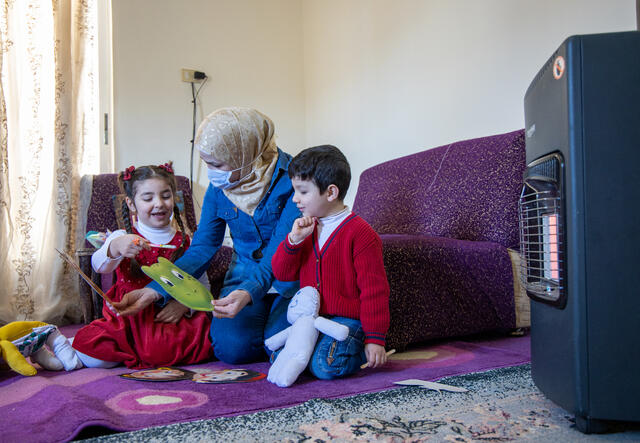
In partnership with the Ministry of Education in Jordan, Ahlan Simsim tested the impact of the TV show on children (primarily from Jordan, ages 5 and 6), in kindergarten classrooms. During this 12-week intervention, children watched one 26-minute episode of Ahlan Simsim each day, in addition to their regular curriculum.
This study found that watching the Ahlan Simsim show had a significant impact on children’s foundational social-emotional skills, such as identifying emotions and applying coping strategies.
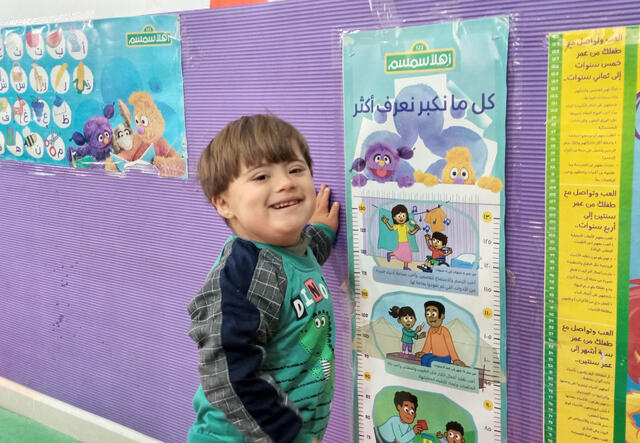
A third evaluation analyzed the impact of an Ahlan Simsim remote adaptation of a program called Reach Up and Learn that targeted caregivers of children 0-3 years old. In this program, trained health outreach staff called caregivers to share their regular curriculum of health tips, and integrated into this 7-10 minutes of Ahlan Simsim parenting guidance per week.
While researchers found no significant impact on parenting behaviors, pointing to the limitations of a short, once-weekly, audio-only interaction, they did find the program reduced caregiver depressive symptoms. Facilitators delivering the program were trained in responsive listening and non-judgmental rapport and used these skills during well-being check-ins with caregivers. These are believed to be key drivers of the finding on improved caregiver mental health caregivers, offering a window into new ways to support their mental health.
How has Ahlan Simsim helped children affected by conflict and crisis in the Middle East?
— IRC - International Rescue Committee (@RESCUEorg) May 16, 2023
Here are three ways the IRC and @SesameWorkshop’s groundbreaking initiative is making a difference⬇️ pic.twitter.com/qxp2CJE1FI
As the largest ever early childhood intervention in humanitarian response, Ahlan Simsim has taught the world how to support the development of young children living in crisis and conflict affected areas.
“This research shows that combining the IRC’s expertise in communities affected by crisis with the proven impact of Sesame’s educational media has exceptional impact,” says IRC president and CEO, David Miliband. “The task now is to spread the message and catalyze lasting change for all children affected by crisis around the world.”
Overall, the findings provide evidence that remote programs can be effective methods to improve child learning and development outcomes, a particularly important finding for the more than 175 million children globally who don’t have access to in-person pre-primary education.
The NYU Global TIES for Children report should serve as a call to action to the global community. Ahlan Simsim is setting a new standard for delivering early childhood support. At a time when more than 100 million people are displaced worldwide, Ahlan Simsim programs should be tailored to local contexts and adopted in other regions where crisis and conflict are preventing children from receiving educational opportunities during a crucial stage of development.
To learn more about Ahlan Simsim, visit here. You can also watch episodes on Ahlan Simsim's YouTube channel and explore the library of resources at ahlansimsim.org.
* Pseudonym used for privacy